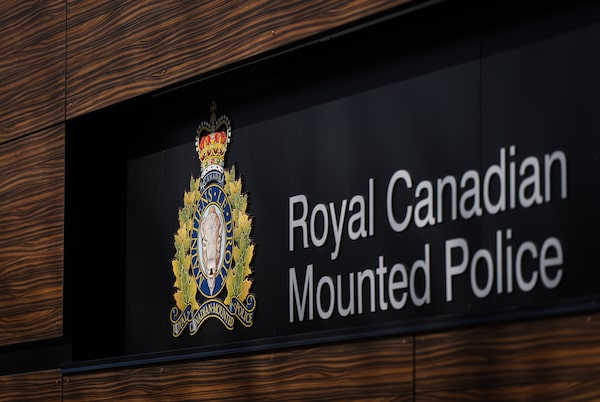
The RCMP logo is seen outside the force's 'E' division headquarters in Surrey, B.C., on Thursday, March 16, 2023. Police have charged a man in the slaying of a woman in Edmonton almost 27 years ago. THE CANADIAN PRESS/Darryl DyckDARRYL DYCK/The Canadian Press
The RCMP is continuing to press Canada’s Minister of Public Safety to end the ban on selling decommissioned police vehicles and parts – a moratorium that the Mounties say is causing operational problems and costing the national force about $13-million a year in lost revenue.
The RCMP has been unable to sell any surplus equipment since January, 2021, nine months after a gunman in Nova Scotia created a look-alike patrol car and impersonated an RCMP officer as part of a killing spree that claimed 22 victims. The moratorium was announced after a second impersonation incident, in which a 23-year-old man from Antigonish, N.S., was accused of attempting to pull over drivers around Halifax using what looked like an unmarked police vehicle.
In both cases, the vehicles were former police cars bought through the federal government’s surplus equipment auction service, GCSurplus. In an internal briefing note signed by former commissioner Brenda Lucki and obtained by The Globe and Mail through an access to information request, the RCMP asked the minister to immediately end the ban on selling all equipment, with the exception of patrol cars.
The RCMP memo says more than 3,600 vehicles and other assets are being stored or crushed each year as a result of the moratorium, costing the force around $13-million in annual lost revenue that would normally come from auctions, in addition to scrapping and storage costs. Many of those vehicles were used only for administrative purposes, or include tires, snowmobiles, minivans and trailers that “pose an extremely low risk for impersonating an officer,” the memo said.
The national force has repeatedly complained internally to the Minister of Public Safety that the moratorium is too broad. It says the ban is causing financial problems because revenue from selling decommissioned vehicles has historically been used to buy new fleet equipment.
“The RCMP is facing operational and financial pressures related to the suspension of sales, especially with the large volume of vehicles that must now be crushed or stored. The RCMP is running out of storage space, which is impacting policing operations,” said the briefing note, dated July 5, 2022, but only recently released by the RCMP.
“The additional storage and destruction costs are putting financial pressure on the department.”
The RCMP also told the minister that it would wait until after the public inquiry into the Nova Scotia mass shooting before providing recommendations on reinstating the sale of former patrol cars. The inquiry’s final report was delivered in March, but the RCMP said Friday it has still not provided direction to the minister on what should be done with retired police vehicles.
Public Safety Minister Marco Mendicino’s office did not respond to repeated requests for comment.
An internal RCMP review of the force’s decommissioning process found that while there are safeguards in place, such as protocols to remove decals and police equipment mounted on the cars, it’s still difficult to prevent someone building a look-alike police vehicle and using it to impersonate a Mountie. In the case of the Nova Scotia gunman, much of the equipment used to build the fake patrol car was bought on eBay, and an employee at a local print shop provided the mock RCMP decals.
“Despite sound processes and practices, controls can reduce the risk and opportunity for criminal or malicious intent, but they cannot guarantee that intentional misuse or intentional impersonation of a policing vehicle will never occur,” the report says.
The RCMP says it has the largest law enforcement land fleet in North America, with about 12,000 on-road vehicles. The force says it still must pay a third-party garage to have its old vehicles decommissioned, regardless of whether they’re being destroyed or resold.
The mass-shooting inquiry recommended that the RCMP and minister work with GCSurplus, the federal auction service for used government equipment, to find ways to keep roadworthy vehicles within government fleets, even when they’re no longer suitable for policing. It also said if the RCMP resumes selling decommissioned assets, it should have to report those sales publicly.
 Greg Mercer
Greg Mercer